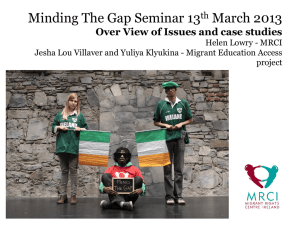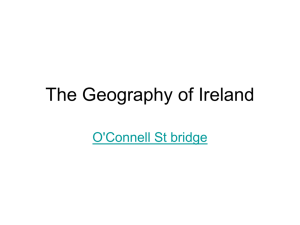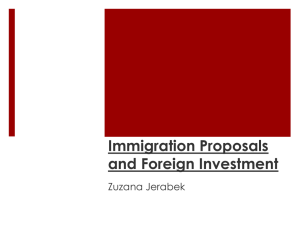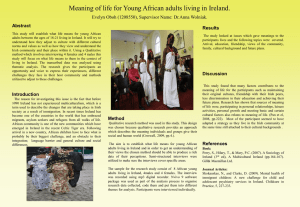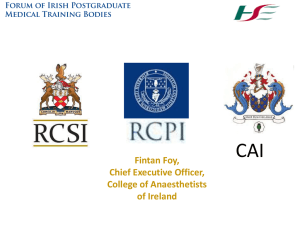Ireland - UK Common Travel Area Agreement
advertisement
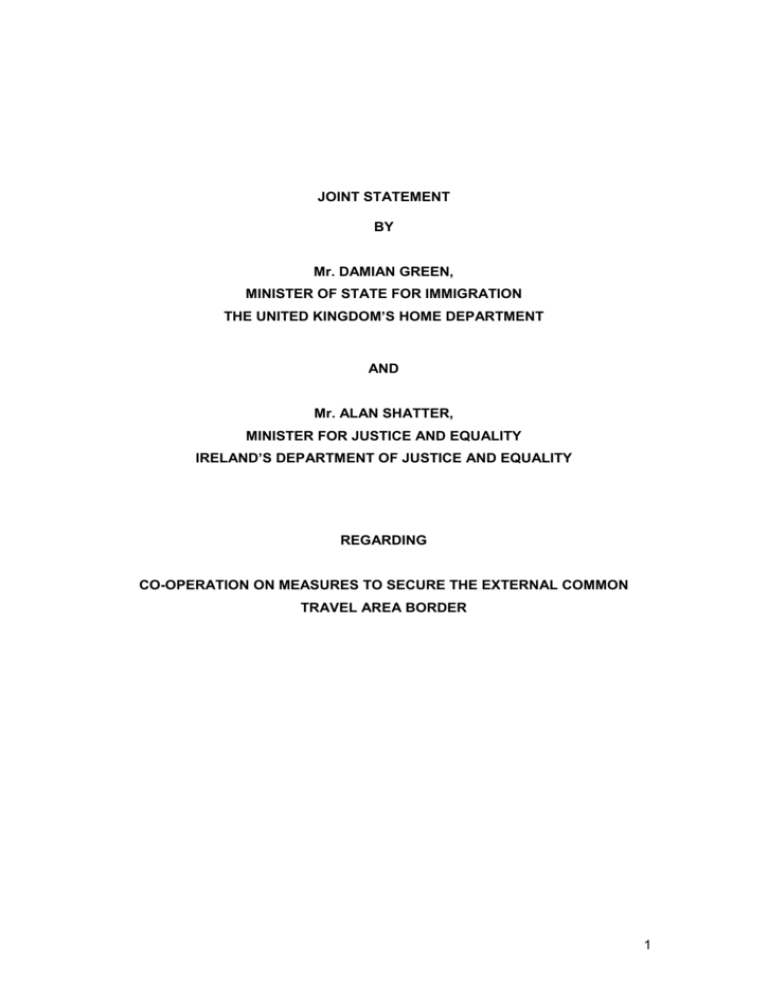
JOINT STATEMENT BY Mr. DAMIAN GREEN, MINISTER OF STATE FOR IMMIGRATION THE UNITED KINGDOM’S HOME DEPARTMENT AND Mr. ALAN SHATTER, MINISTER FOR JUSTICE AND EQUALITY IRELAND’S DEPARTMENT OF JUSTICE AND EQUALITY REGARDING CO-OPERATION ON MEASURES TO SECURE THE EXTERNAL COMMON TRAVEL AREA BORDER 1 Introduction 1. Ireland’s Department for Justice and Equality and the United Kingdom’s Home Department in recognition of the protection of the Common Travel Area (CTA) arrangements, as a legitimate and fundamental public policy for both the Irish and United Kingdom Governments, have committed to a joint programme of work on measures to increase the security of the external Common Travel Area border. Purpose and aims 2. The purpose of the Joint Programme is to reinforce the excellent co-operation that already exists between the United Kingdom Border Agency (UKBA), of the Home Department, and the Irish Naturalisation and Immigration Service (INIS), of the Department of Justice and Equality, in relation to the protection of the Common Travel Area and to provide a framework for a more strategic approach for this co-operation. The aims of the Programme are to Facilitate the movement of legitimate travellers within the CTA; Identify and develop further measures to enhance economic development between the two jurisdictions; Prevent individuals intent on abusing the arrangement from travelling to the CTA; Support and facilitate the return of individuals to their country of origin where they do reach or enter the CTA unlawfully; and Develop ways of challenging the credibility of visa and asylum applications where appropriate and develop mechanisms of redocumentation. The two governments will look to achieve their aims through developing common standards and systems for entry into the CTA, whilst retaining the right of free movement for those eligible to do so. Initially the UK and Ireland will focus on enhanced cooperation in a number of key areas. 3. Visas The two governments will continue to seek ways to improve co-operation in the field of visas by developing joint standards of entry and the capability to challenge the credibility of applications. This will provide a platform from which further cooperation in the area of mutual visa recognition, possibly up to a fullycommon short stay visit visa, can be pursued. Progress has already been achieved in this area. From July 2011, Ireland is recognising, on an 18 month pilot basis, UK “short term visit visas” (Visa Waiver Programme) for the purposes of travel to Ireland from the UK by visa required nationals of 16 countries. The two governments commit to co-operating to the fullest extent possible to align the list of nationals who are visa required for travel to the two countries. In addition both countries are reviewing the standards for the consideration and determination of applications by visa nationals to visit either country and to explore the viability of a “Common Travel Area visit visa” including the possibility of a pilot project. 2 4. Data sharing The two governments understand that the overall aim through working together in data sharing is to develop data sharing capabilities that will support ongoing action to identify and combat abuses of the CTA, including preventing persons who would seek to abuse the CTA from travelling to the UK and Ireland, returning those who do enter the CTA without the appropriate authority to do so to their country of origin and allowing for the challenging of credibility of applications and re-documentation of persons without identity documents and those using aliases. The two countries will work together to the greatest extent possible to roll out the exchange of biographic and biometric visa data across overseas locations and to continue co-operation on establishing the immigration histories and identification of failed asylum seekers for the purpose of reaching final decisions in respect of such cases and, where appropriate, facilitating returns to countries of origin. Data sharing initiatives will be the subject of Memoranda of Understanding concluded between the UK and Ireland, and carried out in compliance with the domestic law and policy of each country. 5. e-Borders/Irish Border Information System (IBIS) The two governments understand that the overall aim through working together in the development of e-Borders/IBIS is to develop an electronic border management system/s to identify, as early as possible, those persons who have no right to enter the CTA or who would seek to cause harm, so that appropriate action can be taken to deal with them at the earliest possible juncture. Both governments are committed to the development of such electronic border management systems, building on the experience gained by the UK in rolling out their e-Borders system, and will continue to explore all possibilities to make this happen. Inside the Common Travel Area (CTA) 6. A fundamental feature of the CTA arrangement is the freedom of movement for persons travelling between Ireland and Northern Ireland which continues to be of immense importance to the economic, social and cultural wellbeing of both jurisdictions. It is essential that the benefits derived from this arrangement are not undermined by illegal movement around the CTA to exploit the immigration and asylum systems in both the UK and Ireland and to manipulate social welfare systems or to cause other harm. Operation Gull, a UK and Ireland initiative operating on both sides of the border, and the creation of an Immigration Unit in Dundalk by An Garda Síochána have been highly successful in curbing illegal migration between Ireland and Great Britain through Northern Ireland. Furthermore, a range of joint operations involving relevant immigration personnel from both jurisdictions and the investigative division of the Irish Department of Social Protection have also been very successful as a result of detections flowing from Operation Gull. Other initiatives have been developed in relation to joint training, sharing immigration liaison officer resources and immigration information and biometric exchanges. Both governments are committed to continuing to build on these initiatives. 3 Oversight 7. The joint UK-Ireland Common Travel Area Forum (CTAF) and the Operational and Policy sub-groups of this forum will drive the implementation of this programme of work and will be responsible for reporting to respective Ministers on an ongoing basis. The CTAF will meet at regular intervals as required, but not less than twice a year, and will comprise relevant senior officials from both jurisdictions. The Operational and Policy sub–groups will meet as required. 8. This joint statement embodies the understanding of the participants. It is not intended to create legally binding obligations, nor to create or confer any right, privilege or benefit on any person or party, private or public. 9. The foregoing record represents the understandings reached between the Government of the United Kingdom of Great Britain and Northern Ireland and the Government of Ireland upon the matters referred to therein. Signed in duplicate at Dublin, on the 20th December, 2011 Damian Green, Minister for Immigration, for the Government of the United Kingdom of Great Britain and Northern Ireland Alan Shatter, Minister for Justice and Equality for the Government of Ireland 4


